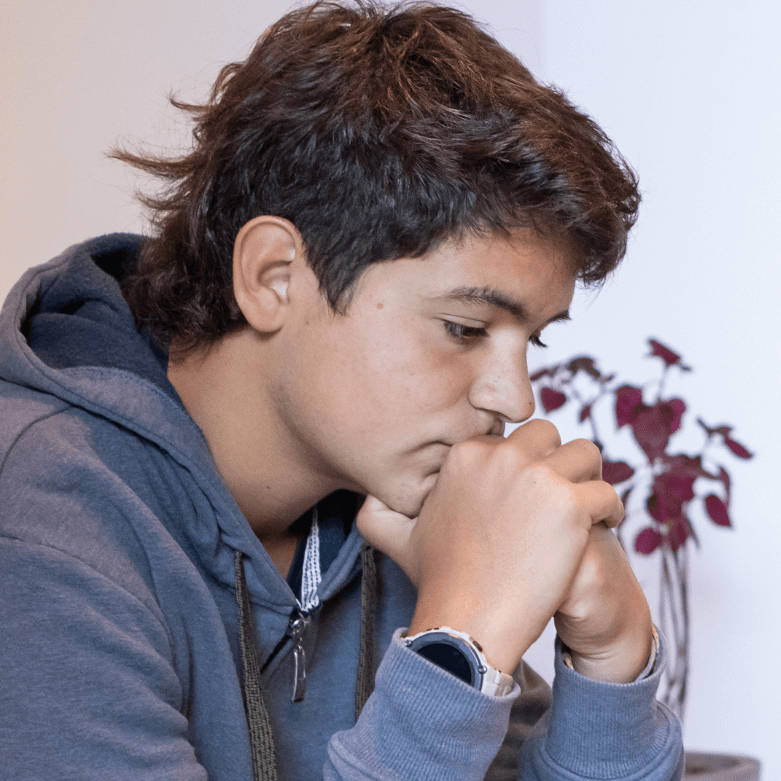Treatment For Generalized Anxiety Disorder (GAD) For Teens In Dallas, Texas
When a generalized anxiety disorder (GAD) is left untreated, it can lead to social isolation and clinical depression, causing trouble with work, relationships, and routine activities. Teenagers are especially vulnerable during this naturally tumultuous time in life, making GAD for teens a serious concern for long-term well-being. BasePoint Academy offers compassionate, evidence-based generalized anxiety disorder treatment options designed to support every GAD teenager in building coping skills and emotional resilience. Call us today at (972) 357-1749 for more information about treatment for GAD.
Generalized Anxiety Disorder Treatment at BasePoint Academy
BasePoint Academy in Texas, serving Dallas, specializes in Teen Generalized Anxiety Disorder Treatment. With campuses in Arlington, Forney, and McKinney, we provide evidence-based therapy tailored to teens’ unique needs. Our adept team conducts assessments, diagnoses, and implements behavioral interventions, applying cognitive-behavioral therapy. Recognizing the urgency in managing anxiety, we offer swift same-day admissions and emergency mental health admissions, ensuring immediate attention.
Financial concerns should never hinder access to treatment. We accept insurance, offering payment options covering counseling, non-pharmacological treatments, and family support. Embracing a holistic approach, we employ intervention strategies. Reach out to explore suitable payment alternatives. Our commitment is to deliver optimal care, fostering your teenager’s well-being.
Generalized Anxiety Disorder Treatment Admissions and Intake
Our complimentary assessment with a licensed clinician will provide you with a recommendation for the appropriate level of care for your teen struggling with general anxiety. We can also check your insurance coverage levels.
Call us today to schedule a complimentary same-day assessment at (972) 357-1749 or complete our inquiry form.
Generalized Anxiety Disorder Admissions form
Contact BasePoint Academy Today
Contact us today to schedule a free confidential assessment for your teen with a licensed clinician.
You can also get in touch to talk with our mental health experts about treatment needs, care options and your insurance coverage levels.
Call: (972) 357-1749Check Your Insurance
What is Dallas Known for?
Dallas, Texas, began as a small frontier town but today it is the ninth largest city in the U.S. Alongside an iconic cowboy culture and thriving art scene, the city is a business hub and home to several Fortune 500 companies. The Dallas-Fort Worth area also hosts a diverse range of industries.
The location is ideal for businesses that want to benefit from the city’s booming economy, central location, and favorable tax policies. If you are looking for it, Dallas probably has it, from the Dallas Museum of Art, which is one of the most well-known and highly regarded museums in the country to outdoor activities like the 3.5 mile Katy Trail or the more adventurous Trinity River Audubon Center that sits on 120 acres and offers several activities from bird watching to kayaking. Shoppers are treated to a variety of high-end designer boutiques, Indie shops, and large luxury shops like Hermes and Christian Louboutin.

Statistics on Generalized Anxiety Disorder in Texas
In 2020, there were more than 500,000 children in Texas diagnosed with anxiety or depression, which was a 23% increase over the past several years. One study found 22% of Texas youth in middle school and high school had moderate to severe anxiety, 27% had moderate to severe depression, and 4% expressed suicidal ideation.
In May 2022, 30% of adult Texans with symptoms of anxiety and/or depression who needed therapy had not received it in the past four weeks, as compared to the average in the U.S. of 28.2%. The highest prevalence of mental illness was anxiety disorders that affected 19.1% of people, followed by major depressive disorder that affected 8.3%. Women are more likely to report a mental illness than men.
BasePoint Academy Accepts health Insurance
We accept most major health insurance providers in Texas and can check your treatment coverage levels on your behalf
Treatment Centers for Generalized Anxiety Disorder in Texas
BasePoint Academy has multiple facilities near Dallas, Texas. Each facility is staffed by licensed mental health professionals who have the education and expertise to work with adolescents. This means that you can choose the facility closest to your home and be assured your teenager will receive the same excellent level of care as they would at any BasePoint Academy facility.
- Arlington, Texas: 3900 Arlington Highlands Blvd, Suite 237, Arlington, TX 76018
- Forney, Texas: 713 W Broad St, Suite 200, Forney, TX 75126
- Frisco, Texas: 8275 Judges Way, Suite 100I, Frisco, TX 75036
- McKinney, Texas: 4733 Medical Center Drive, McKinney, TX 75069

Treatment Center in Arlington, Texas
Arlington, Texas, is part of the Dallas-Fort Worth Metroplex. It was founded in 1876 and has a current population of over 392,000 people. It is located 12 miles east of Fort Worth and 20 miles west of Dallas. The city is a major center for entertainment, business, and education. Arlington is home to several Fortune 500 companies, the University of Texas at Arlington, the NFL Dallas Cowboys, and the MLB Texas Rangers.
- BasePoint Academy – Arlington, Texas: 3900 Arlington Highlands Blvd, Suite 237, Arlington, TX 76018, United States
Treatment Center in Forney, Texas
Forney, Texas, is located 20 miles east of Dallas and is also part of the Dallas-Fort Worth Metroplex. Forney is also growing with a population of over 27,000 people. The community is defined by a shared sense of values and a desire to balance a unique pioneering past with a vision for the future that centers on reinventing a historic downtown area and focusing on a family-centered lifestyle.
- BasePoint Academy – Forney, Texas: 713 W Broad St, Suite 200, Forney, TX 75126, United States
Treatment Center in McKinney, Texas
McKinney, Texas, is roughly 30 miles north of Dallas and has a growing population of over 200,000 people. The historic downtown area boasts more than 120 shops and antique stores. It’s one of Texas’s oldest and largest historic districts, including the Chestnut Square Heritage Village that sits on two and a half acres and includes a replica one room schoolhouse, chapel, and store.
- BasePoint Academy – McKinney, Texas: 4733 Medical Center Drive, McKinney, TX 75069, United States
How to Find GAD Therapy Near Me in Dallas, Texas
There are several steps you can take to find a generalized anxiety disorder therapy center near you in Dallas, Texas. The first step is an online search in your favorite web browser. Use keywords such as “treatment for generalized anxiety disorder in teens.” “GAD treatment plan” or “treatment plan for generalized anxiety disorder.”
Include your city name and “Texas” to return results that are close to where you live. After you make a list of the treatment centers in your area, check out their websites looking for the type of treatment options they offer and whether they offer specialized care for adolescents.
Look for treatment centers that are accredited, which ensure that your teenager receives care that meets national standards. After you create a short list, call those treatment centers to find out more about staff education, what the facility offers, and to speak with an admission counselor for a free assessment.
Finally, schedule a tour of the treatment centers that meet your criteria so you can see the facility, meet with some of the staff, and speak with a financial counselor about insurance verification and financial options.
Contact BasePoint Academy Today
Contact us today to schedule a free confidential assessment for your teen with a licensed clinician.
You can also get in touch to talk with our mental health experts about treatment needs, care options and your insurance coverage levels.
Call: (972) 357-1749Check Your InsuranceWhat is Generalized Anxiety Disorder?
At one time, everyone experiences symptoms of anxiety. However, teenagers who experience a generalized anxiety disorder (GAD) experience excessive anxiety and worry that’s difficult to control and typically interferes with daily activities. The symptoms seem like panic disorder, obsessive compulsive disorder, and other types of anxiety, but each of these are different conditions.
GAD is a long-term challenge, but in most cases the symptoms improve with a combination of medication and psychotherapy—common generalized anxiety disorder treatment options. At BasePoint Academy, our licensed medical professionals specialize in the treatment of adolescent development and psychology. They help teenagers make lifestyle changes to help reduce symptoms and learn coping skills to improve their quality of life, as part of our GAD for teens services.


Do Mental Health Centers Offer Therapy for GAD?
Yes, mental health centers offer therapy for teen generalized anxiety disorders. Treatment for GAD in teens can include medications to address neurotransmitter imbalance, cognitive-behavioral therapy and mindfulness meditation to address symptoms of GAD. Your teenager will learn relaxation techniques, stress management, and techniques to identify physical and emotional distress that is part of the mind-body connection.
These strategies help to reduce symptoms so your teenager can think clearly. It is important to note that teenagers are not just young adults, but instead are going through unique physical and psychological changes in life. They require specialized care, which BasePoint Academy offers. Our licensed mental health professionals have the education, training, and experience to address the needs of adolescent psychology to promote teenage well-being.
Common Treatment Methods for Generalized Anxiety Disorder
Treatment for generalized anxiety disorder typically encompasses several options as well as medication. This combination offers your teenager an evidence-based and holistic approach to a customized treatment plan for GAD.
The following is a list of examples of common treatments for GAD. However, it’s important to remember that this is not a full list of examples. For more information about how BasePoint Academy customizes GAD therapy for your teenager, call us at (972) 357-1749.
Cognitive-Behavioral Therapy (CBT)
Cognitive-behavioral therapy (CBT) is a behavioral mental health treatment for generalized anxiety disorder in teens. CBT is based on neuroscience and scientific psychology. It is the foundation for treatment using non-pharmaceutical means. Behavioral therapy typically leads to a reduction in symptoms, including overwhelming worry that is the basis for many of the mental and physical symptoms your teenager experiences.
Exposure Therapy
Exposure therapy is a treatment option that helps individuals confront their fears. Teenagers with symptoms of generalized anxiety disorder may avoid specific situations to help reduce their feelings of fear, but in the long term this can make the condition even worse. Exposure therapy is an evidence-based component in treatment for several types of anxiety disorders, including generalized anxiety disorder.
Mindfulness and Relaxation Techniques
As adolescents learn relaxation skills, it helps to reduce muscle tension, slow their breathing, and calm their mind. These relaxation skills can affect the physical symptoms of general anxiety disorder, which in turn has a significant influence on your adolescent’s mind. Findings have suggested that mindfulness meditation not only reduces physical symptoms but also symptoms of generalized anxiety disorder.Medication
Medication treatment is sometimes referred to as pharmacotherapy. It involves the use of drugs to help reduce anxiety symptoms, which in turn increases the benefit of behavioral and talk therapies. At BasePoint Academy, our medication management program is physician-led and incorporates a thorough medical and psychiatric evaluation to determine the correct medication and dosage.
Stress Management Techniques
High levels of anxiety and alterations in physical health often increase a teenager’s stress. The symptoms of generalized anxiety disorder may become a vicious cycle during which stress increases the symptoms and the symptoms increase stress. The mental health professionals at BasePoint Academy use stress management techniques to improve your teenager’s ability to cope with daily life.
Biofeedback for GAD
Biofeedback is a therapeutic intervention that uses monitors and sensors to identify body reactions to situations or stress. A therapist reads the monitors and interprets how the body is reacting to stimuli and then helps your teenager develop stress management techniques that can reduce their bodily symptoms and responses.
These techniques can include deep breathing, progressive muscle relaxation, and guided imagery. Biofeedback sessions teach your teenager how to identify bodily responses and manage them over time.
Symptoms of Generalized Anxiety Disorder
Teenagers with generalized anxiety disorder can experience psychiatric symptoms and physical symptoms. The following is a list of examples of symptoms your teenager may exhibit. However, it’s important to recognize that this is a partial list of symptoms.
For more information, call BasePoint Academy at (972) 357-1749.
Excessive Worry
Excessive worry is a typical symptom associated with generalized anxiety disorder. Your teenager may exhibit signs of persistently worrying or being anxious about situations or events that are out of proportion to the situation.
Excessive worry can cause your teenager to overthink their plans or make multiple solutions to encompass all possible worst case outcomes. Excessive worry makes it difficult to handle uncertainty and they often feel indecisive and are fearful of making the wrong decision.
Fatigue or Feeling Tired
Teenagers typically feel fatigued or tired, especially when they don’t get enough sleep. It can be challenging to determine if the lack of sleep is related to sleep disturbance or if it’s just a normal part of being a teenager. Fatigue can impact their ability to perform academically and athletically, as well as difficulty concentrating throughout the day.
Difficulty Concentrating
Difficulty concentrating can be related to fatigue, but it can also be related to high levels of anxiety, which makes it difficult for your teenager to focus on a single task. Your teenager may tell you that they have difficulty concentrating because they can’t stop worrying and this can impair their ability to function throughout the day.
Sleep Disturbances
There are two different types of sleep disturbance that are known to be associated with mild to moderate generalized anxiety disorder. The first is a sleep maintenance disturbance in which your teen awakens during the night and is unable to sleep through the night. The second is difficulty falling asleep at night. Both respond well to psychological treatment.
Physical Symptoms
You may notice physical symptoms in your teenager that are associated with general anxiety disorder. While these symptoms are associated with the condition, having these symptoms does not necessarily mean your adolescent has GAD.
Physical symptoms can include excessive sweating, gastrointestinal disturbances, irritability, trouble sleeping, and nervousness or being easily startled. It is important that your teenager is assessed for physical and mental health conditions, since these physical symptoms can occur with multiple other health conditions.
Perfectionism or Fear of Mistakes
Your teenager may exhibit difficulty with perfectionism or fear of making mistakes. While society values the ability to do something right every time, perfectionism is not a healthy mental state.
If your teenager worries excessively about making mistakes or continues to work on a task until they feel it’s perfect, consider a free assessment at BasePoint Academy to determine if therapy for generalized anxiety disorder may help reduce symptoms.
Irrational Insecurity
Irrational insecurity is another symptom of generalized anxiety disorder that can appear to take over your teenager’s life. This may occur in a specific area, or it may be a generalized insecurity. In other words, teens may be insecure about their academic performance, their relationship with their friends, or they may feel insecure about everything that occurs during the day.
Contact BasePoint Academy Today
Contact us today to schedule a free confidential assessment for your teen with a licensed clinician.
You can also get in touch to talk with our mental health experts about treatment needs, care options and your insurance coverage levels.
Call: (972) 357-1749Check Your InsuranceDoes Insurance Cover GAD Treatment for Teens in Texas?
Yes, most health insurance companies, such as UHC insurance, BCBSTX coverage, and Aetna insurance, offer some level of coverage for GAD therapy. In 2010, the Affordable Care Act required all health insurance policies written after 2010 to include coverage levels for essential health services. The mandate includes mental health conditions and substance use disorders as essential health services.
While coverage is mandated by law, every policy has different benefits and limitations. The best way to understand what your policy covers for your adolescent is to call BasePoint Academy. Our admission specialist will answer your questions about treatment and verify your insurance coverage. You can also request a free assessment to determine if BasePoint Academy can offer the help your teenager needs.
What is the Admissions Process for Generalized Anxiety Disorder Treatment for Teens?
Admission for generalized anxiety disorder treatment begins with your first phone call. Our admission specialist can verify your insurance coverage and discuss your estimated out of pocket costs. You can also request a free anxiety assessment to determine if BasePoint Academy offers the care needed for your teenager.
Once you and BasePoint Academy decide treatment is appropriate, our admission specialist will walk you through the process of a medical and psychological evaluation that forms the basis of your teenager’s customized treatment plan.
Types Of Anxiety Treated in Therapy for Generalized Anxiety Disorder
There are many different types of anxiety that have similar treatment and symptoms as generalized anxiety disorder. The following is a list of examples. However, it is important to remember that these are examples and not a full list. If you have questions about your teenagers’ symptoms of anxiety and want more information about treatment, call BasePoint Academy at (972) 357-1749.
Panic Attack Treatment For Teens
Teenagers can have panic attacks, also called a panic disorder. Panic attacks are sudden periods of intense fear and a sense of losing control even when there is no clear and present danger. Not everyone who has a panic attack will develop a panic disorder.
During a panic attack, your teenager may begin sweating or trembling, experience chest pain, and have feelings of being out of control or impending doom. Evidence-based behavioral therapies and medication can help reduce these symptoms.
Social Anxiety Treatment Plan For Youth
Social anxiety disorder triggers symptoms of intense and persistent fear that others are watching and judging you. Your teenager may have symptoms of a pounding or racing heart, stomachache, or feelings of self-consciousness or fear that people will judge them.
Treatment for social anxiety disorder typically includes cognitive-behavioral therapy that has been validated and has shown remarkable success for teenagers and adults.
Performance Anxiety Treatment for Teens
You might think that performance anxiety only affects people in sports, but nearly anyone can experience what is commonly thought of as stage fright. Performance anxiety surfaces in situations when you’re about to embark on a demanding activity.
While moderate amounts of stress can enhance performance, high levels can cause problems. Treatment plans typically include mindfulness therapy, cognitive-behavioral therapy, and exposure to high performance situations in which your young adult can practice the skills they’ve learned.
Existential Anxiety Treatment for Young Adults
Existential anxiety is a feeling of panic that happens when a person faces concepts of death or the meaning of life. They can get overwhelmed by their insignificance as it relates to the universe. A person can develop this condition while thinking back on former decisions or acts.
Behavioral therapists help your teenager to examine and explore these feelings and accept that they are a normal part of life. This helps to decrease symptoms and encourages your teenager to use this experience as a catalyst for personal growth and development.
Chronic Worrying Treatment for Adolescents
Chronic worrying is a symptom of generalized anxiety disorder and often responds well to prescribed medication alongside behavioral therapy, such as cognitive-behavioral therapy, dialectical behavioral therapy, and motivational interviewing. Your teenager may also benefit from teenage support groups where they can learn coping strategies and stress management in a group setting.
Contact BasePoint Academy Today
Contact us today to schedule a free confidential assessment for your teen with a licensed clinician.
You can also get in touch to talk with our mental health experts about treatment needs, care options and your insurance coverage levels.
Call: (972) 357-1749Check Your Insurance
How Much Does GAD Therapy for Teens Cost in Dallas, Texas?
GAD treatment costs vary depending on your teens customized plan, and your insurance benefits and limitations. For example, a residential treatment program will cost far more than a partial hospitalization program. When you call BasePoint Academy at (972) 357-1749 or contact us online, our admission specialists can verify your insurance coverage and give you an estimate of your out-of-pocket costs.
Statistics on Generalized Anxiety Disorder in Texas
- In February 2023, 36.8% of Texas adults expressed feelings of anxiety and depression as compared to 32.3% of adults throughout the U.S.
- There were more than 500,000 children in Texas diagnosed with anxiety or depression in 2020, which was a 23% increase over the past several years.
- One study found 22% of Texas youth in middle school and high school had moderate to severe anxiety, 27% had moderate to severe depression, and 4% expressed suicidal ideation.
- In May 2022, 30% of adult Texans with symptoms of anxiety and/or depression who needed therapy had not received it in the past four weeks, as compared to the average in the U.S. of 28.2%.
- In adults, the highest prevalence of mental illness was anxiety disorders that affected 19.1% of people, followed by major depressive disorder that affected 8.3%. Women are more likely to report a mental illness than men.
Effectively Treat Teen Mental Health With BasePoint Academy
We can help your teen and your family address and overcome mental health concerns with expert care and a safe environment. Call today to discover the treatment for long-term healing.






